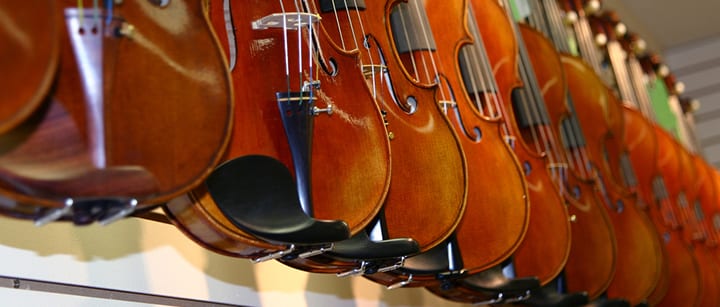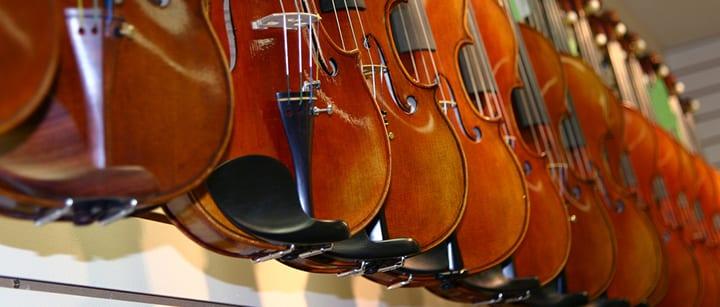 New to the violin? Not sure how often you should be practicing? Find out here with these violin practice tips from Brooklyn, NY teacher Julie P...
New to the violin? Not sure how often you should be practicing? Find out here with these violin practice tips from Brooklyn, NY teacher Julie P...
Whether you are just starting to learn the violin or have been playing for years, the question of how often to practice is always important to answer. This question is also tied to how long you should practice. The key factor to remember is that a lot of short practice sessions will be much more effective than one or two marathon sessions.
The most effective practice routines include five or more days of practice each week. However, recreational violin players will probably enjoy a more relaxed practice schedule of three to four days a week. Practicing one or two days a week is not very effective because the brain needs more frequent reinforcement in order to retain the concepts and establish muscle memory. That being said, I have taught a number of adults who rarely practiced and yet still enjoyed our weekly lessons as a time where we would play simple songs and duets together.
There are a number of other factors to consider when determining how much to practice: age, musical goals, musical commitments, non-musical commitments, and physical health.
Age
Since violins come in a range of sizes, children as young as two years old can start to learn the violin. Students of all ages need three or more practice sessions a week, especially when they are first starting out.
Here are some basic guidelines for the appropriate lengths of practice sessions. More than one session can be completed in a single day, or a single session can be broken down in multiple shorter sessions. All of these guidelines are subjective and are dependent on the maturity level and attention span of the player.
- Ages 2-4: 5-10 minutes
- Ages 5-7: 10-20 minutes
- Ages 8-12: 20-30 minutes
- Ages 13-Adult: 30+ minutes
Here’s a helpful video with some quick pointers on how to make the most of a shorter practice session. Note: This practice session shouldn’t be your everyday routine; it’s more ideal for those days when you don’t have much time to spare!
Musical Goals
The more ambitious your musical goals are, the more often you should practice. If you simply want to enjoy playing music that you know and love, practicing three to four days a week should be sufficient and quite enjoyable. If you’d like to enter university as a music major, you should aim for five or more days most weeks, often completing multiple sessions per day.
Musical Commitments
The music you study in lessons is part of what you should practice. If you are part of a performing ensemble such as a school or community orchestra, you’ll also have that music to practice, which could add to the length of your practice sessions. If you have a recital or concert coming up, you’ll probably find that you need more practice time as the date approaches in order to adequately prepare both mentally and physically.
Non-Musical Commitments
All musicians have lives outside of music and the healthiest musicians respect and satisfy their non-musical needs and commitments. The best way to make sure that the demands of life don’t interfere with your musical growth is to establish a regular practice routine that doesn’t suffer from the occasional missed practice session.
Physical Health
It is possible to practice too much and end up with a performance-related injury. If this is the case, you’ll need to limit your practice sessions as you work with a physical therapist to pinpoint the postural causes of the injury. Often the physical therapist will have a specialized recommendation for how long and how often to practice. I have also worked with a few adult students who suffered from arthritis. In addition to limiting the length of their practice sessions, these adults found that there were certain days when the weather made it too painful for them to play the violin. I certainly understood this limitation and these students did a great job of not letting the interruptions interfere with their enjoyment of playing.
No one can determine how much you should practice the violin except for you, because you are the one who sets your own musical goals. Whatever these goals are, take the time to find a practice routine that supports your desired growth as a violinist. If you’re not sure what your goals are, a good teacher can help you think this through, and provide additional violin practice tips. If you don’t yet have a teacher, check out some of the great teachers at TakeLessons!
 Julie P. teaches flute, clarinet, music theory, and saxophone lessons in Brooklyn, NY. She received her Bachelor’s degree in Music Education from Ithaca College and her Masters in Music Performance from New Jersey City University. Learn more about Julie here!
Julie P. teaches flute, clarinet, music theory, and saxophone lessons in Brooklyn, NY. She received her Bachelor’s degree in Music Education from Ithaca College and her Masters in Music Performance from New Jersey City University. Learn more about Julie here!
Photo by lemonjenny
Suzy S.
